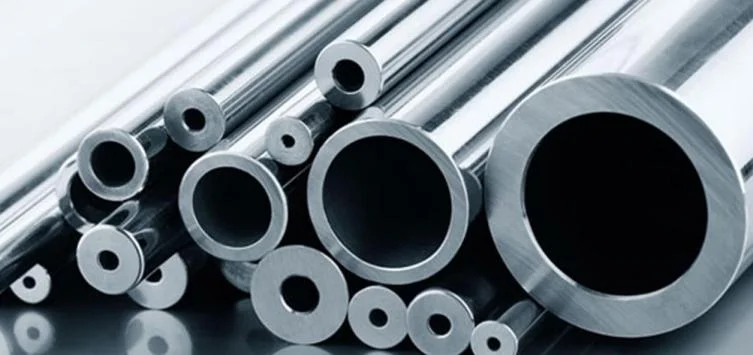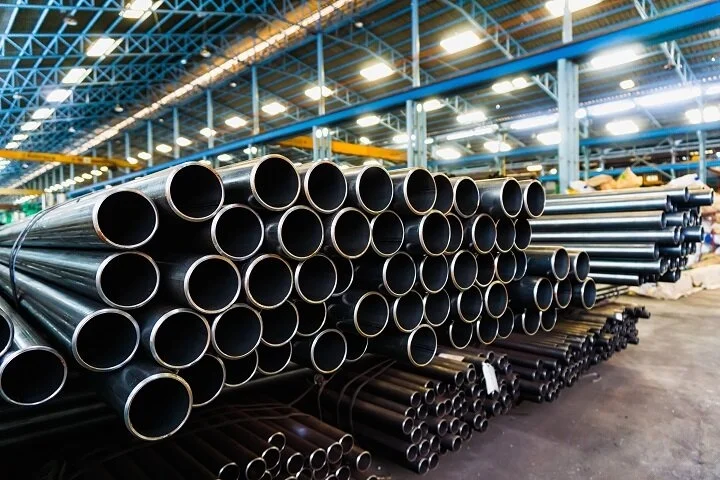Stainless Steel Pipe Manufacturers: Crafting Quality for Global Applications
Stainless steel pipes are indispensable elements within contemporary industries, demonstrating a distinctive amalgamation of qualities that render them indispensable for the secure and efficient conveyance of liquids, gases, and solids. They play a pivotal role across diverse sectors, including manufacturing, construction, energy, healthcare, and more.
In this context, stainless steel pipe manufacturers hold a critical position in assuring the quality, reliability, and functionality of stainless steel pipes. Their meticulous attention to these aspects cements stainless steel pipes as a trusted preference for industries in pursuit of longevity, corrosion resistance, and operational efficiency.

Evolution of Stainless Steel Pipe Manufacturing
The progression of stainless steel pipe manufacturing is a fascinating journey through time, tracing its origins from rudimentary iron pipes to the sophisticated stainless steel piping systems that underpin contemporary industrial infrastructure.
Historical Roots
Iron Pipes: The historical lineage of pipe manufacturing stretches back millennia, to ancient civilizations where primitive iron pipes were employed for fluid conveyance. These early iterations, however, were vulnerable to corrosion, necessitating frequent replacements due to degradation.
The Emergence of Stainless Steel
In the early 20th century, a pivotal moment occurred with the advent of stainless steel, ushering in a transformative era for pipe production. Comprising iron, chromium, and nickel as primary constituents, stainless steel brought about a paradigm shift in pipe material. The introduction of chromium conferred resistance to corrosion, while nickel augmented its durability and strength.
Technological Progress in Production Techniques
1)Metallurgy and Alloy Advancements: The progression of metallurgy and alloy development has been instrumental in elevating the caliber of stainless steel employed in pipe manufacturing. Meticulous control over alloy composition has yielded an array of stainless steel grades, each precisely tailored to meet specific industry requisites, exemplified by the likes of 304, 316, and 316L stainless steels.
2)Manufacturing Processes: Contemporary manufacturing methods have evolved to ensure the consistent production of top-tier stainless steel pipes. These methodologies encompass extrusion, seamless pipe fabrication, and welded pipe construction. Extrusion and seamless processes yield pipes with standardized attributes and sleek surfaces, ideal for sectors that demand hygiene and resistance to corrosion.
3)Welding Advancements: Innovations in welding techniques have markedly enhanced the integrity of stainless steel pipes. Cutting-edge technologies like TIG (Tungsten Inert Gas) welding and orbital welding have mitigated the risk of defects and contamination during the welding phase, thus safeguarding the pipes' enduring corrosion-resistant qualities.
4)Quality Control and Testing: The realm of quality control and testing procedures has undergone profound refinements. Non-destructive testing methodologies, such as ultrasonic and radiographic assessments, empower manufacturers to discern flaws and imperfections in pipes without causing harm. This stringent scrutiny ensures that only pipes conforming to stringent quality benchmarks find their way into the market.
5)Customization and Specialization: Contemporary pipe manufacturing exhibits a penchant for high-level customization, enabling manufacturers to tailor stainless steel pipes to the exact specifications of diverse industries. Whether for applications demanding high pressure in petrochemical facilities, impeccable hygiene standards in food processing, or architectural endeavors, stainless steel pipes can be meticulously customized in terms of dimensions, grade, and finish.
Key Utilizations Across Diverse Industries
Stainless steel pipes, renowned for their exceptional qualities, serve as indispensable components across a spectrum of industries. Here, we explore several prominent sectors where these pipes play pivotal roles:
Plumbing and Potable Water Supply
Stainless steel pipes reign supreme in plumbing and potable water supply systems. Their corrosion resistance and non-reactive nature guarantee the safe delivery of pristine, uncontaminated water to residences and businesses. The robustness and enduring performance of stainless steel render it an ideal choice for water distribution networks, minimizing maintenance demands and ensuring long-term reliability.
Oil and Gas Industry: Exploration and Transportation
Within the oil and gas sector, stainless steel pipes are indispensable for both exploration and transportation endeavors. Their steadfast resistance to corrosion, ability to withstand high pressures, and capacity to endure extreme temperatures make them indispensable for conveying crude oil, natural gas, and refined products from extraction sites to refineries and distribution hubs. Moreover, stainless steel pipes play a pivotal role in offshore drilling and subsea installations, where they contend with the harshest underwater conditions.
Chemical and Pharmaceutical Industries: Process Piping
Stainless steel pipes find extensive utility in the chemical and pharmaceutical domains for process piping. Their unwavering resistance to chemical corrosion ensures the secure transport of aggressive chemicals, solvents, and pharmaceutical constituents. The smooth, non-reactive surface of stainless steel minimizes the risk of contamination, rendering it an ideal choice for applications demanding rigorous quality control and stringent hygiene standards.
Construction: Architectural and Structural Applications
Stainless steel pipes have emerged as favored materials in construction, particularly for architectural and structural purposes. Their aesthetic allure, durability, and imperviousness to corrosion make them ideal for architectural elements such as handrails, facades, and decorative structures. Additionally, stainless steel pipes serve as vital structural components in the construction of buildings and bridges, where their high-strength attributes bolster structural integrity.
Automotive and Aerospace: Demanding High-Strength Requirements
The automotive and aerospace industries rely extensively on stainless steel pipes in applications that necessitate remarkable strength. In the realm of automotive manufacturing, stainless steel pipes feature prominently in exhaust systems, delivering resistance to both heat and corrosion. In the aerospace sector, they find their place in critical aircraft components such as exhaust ducts, hydraulic systems, and fuel lines, where their lightweight yet robust characteristics confer a competitive advantage.
These represent just a glimpse into the diverse array of applications where stainless steel pipes assume crucial roles across industries. Their versatility, durability, corrosion resistance, and capacity to meet stringent performance standards make them invaluable assets in contemporary manufacturing and infrastructure development, contributing significantly to efficiency, safety, and sustainability across various sectors.
Challenges and Innovations for Stainless Steel Pipe Manufacturers
Stainless teel pipe manufacturers face various challenges, and continuous innovation is key to addressing these issues and improving the efficiency and sustainability of the process. Here are some of the prominent challenges and the corresponding innovations in this field:
Addressing Environmental Concerns: Sustainable Manufacturing
Challenge: Environmental concerns, including resource depletion and energy consumption, are pressing issues in manufacturing. The extraction and processing of raw materials for stainless steel production can have a significant environmental impact.

Innovation: Sustainable manufacturing practices are becoming increasingly important. Manufacturers are adopting eco-friendly processes, such as recycling stainless steel scrap to reduce the demand for new raw materials. Additionally, energy-efficient manufacturing techniques and emissions control measures are being implemented to minimize the industry's carbon footprint.
Innovations in Material Science: Newer, More Robust Steel Grades
Challenge: The demand for stainless steel pipes in more challenging environments with extreme temperatures, high pressures, and aggressive chemicals requires the development of stronger and more corrosion-resistant steel grades.
Innovation: Material scientists are constantly working on developing advanced stainless steel alloys with enhanced properties. These newer steel grades offer improved resistance to corrosion, higher tensile strength, and better performance in demanding conditions. Examples include duplex and super-duplex stainless steels, which are known for their exceptional corrosion resistance and strength.
Smart Manufacturing: Integrating AI and IoT for Better Quality Control
Challenge: Ensuring consistent quality in stainless steel pipe manufacturing is crucial, but it can be challenging due to variations in raw materials, production processes, and environmental factors.
Innovation: Smart manufacturing practices are revolutionizing quality control in the industry. By integrating artificial intelligence (AI) and the Internet of Things (IoT), manufacturers can monitor and control the production process in real-time. Sensors and data analytics enable early detection of defects, predictive maintenance, and process optimization. This leads to higher-quality products, reduced waste, and increased efficiency.
Customization and Precision Engineering
Challenge: Industries increasingly demand customized stainless steel pipes that meet specific size, shape, and performance requirements. Achieving this level of precision can be challenging.
Innovation: Advanced manufacturing technologies, such as 3D printing and computer-aided design (CAD), allow for precise customization of stainless steel pipes to meet exact specifications. This flexibility enables manufacturers to produce pipes tailored to the unique needs of various industries, from intricate architectural designs to high-performance industrial applications.
Energy Efficiency
Challenge: Stainless steel pipe manufacturing involves energy-intensive processes, which can contribute to high operational costs and environmental impact.
Innovation: Manufacturers are investing in energy-efficient technologies and processes to reduce energy consumption. This includes using induction heating for pipe welding, optimizing furnace designs, and implementing heat recovery systems to minimize energy waste.
Selecting the Appropriate Stainless Steel Pipe Manufacturer: Vital Considerations
Ensuring the quality and dependability of your piping systems hinges on your choice of a stainless steel pipe manufacturer. Below, we outline key factors to contemplate when making this critical decision:
Reputation and Years in the Industry
1)Reputation: Investigate the manufacturer's standing within the industry. Seek input from past clients and industry experts, as a strong reputation often signifies reliability and quality.
2)Years in the Industry: Consider the manufacturer's experience and tenure in the stainless steel pipe manufacturing sector. Established manufacturers with a proven track record are more likely to deliver dependable products.
Certification and Adherence to International Standards:
1)Certification: Verify whether the manufacturer holds pertinent certifications, such as ISO 9001 for quality management systems. These certifications serve as indicators of a commitment to quality and compliance with industry norms.
2)International Standards: Ascertain that the manufacturer's products align with international standards tailored to stainless steel pipes. ASTM, ASME, and DIN are among the standards frequently referenced in this context, and adherence to them guarantees the pipes' suitability for diverse applications.
Customization Capabilities
1)Tailored Solutions: Evaluate the manufacturer's capacity to furnish customized stainless steel pipes tailored to your specific specifications. Many industries necessitate pipes of unique sizes, grades, and finishes to meet their distinct requirements.
2)Engineering Expertise: Manufacturers equipped with in-house engineering and design capabilities are better positioned to comprehend and efficiently fulfill customization requests.
Client Testimonials and Past Projects
1)Client Testimonials: Solicit client references or testimonials to assess the manufacturer's performance from the vantage point of previous customers. This insight can shed light on their reliability, quality, and customer service.
2)Past Projects: Peruse the manufacturer's portfolio of prior projects, especially those akin to your needs. An examination of their previous work aids in evaluating their ability to meet your requirements.
Quality Control and Testing Procedures
1)Quality Control: Inquire about the manufacturer's protocols and processes for quality control. A steadfast commitment to stringent quality control ensures that their products consistently meet high standards.
2)Testing: Inquire about the testing methods and protocols employed during production. Reputable manufacturers utilize non-destructive testing techniques, like ultrasonic and radiographic testing, to detect any defects or imperfections in the pipes.
Lead Times and Delivery Reliability
1)Lead Times: Assess the manufacturer's lead times for production and delivery. Punctual delivery is paramount for effective project planning and execution.
2)Delivery Reliability: Evaluate the manufacturer's track record in terms of delivering products on schedule and in the quantities agreed upon.
Cost and Value
1)Cost: While cost is a significant consideration, it should not be the sole determinant. Weigh the overall value provided by the manufacturer, which encompasses product quality, customization capabilities, and reliability, to make a well-informed decision.
Environmental Practices:
2)Sustainability: If environmental responsibility holds importance for your organization, inquire about the manufacturer's sustainable practices. Some manufacturers incorporate eco-friendly processes and employ recycled materials in their operations.
CONCLUSION
Stainless steel pipe manufacturers hold a central position in providing critical components that serve as the foundation for numerous industries worldwide. Their unwavering commitment to precision engineering, strict adherence to international standards, and relentless pursuit of innovation result in the production of top-tier stainless steel pipes, meeting the diverse requirements of global applications.
In a world marked by constant change, where industries place increasing emphasis on efficiency, safety, and sustainability, these manufacturers persistently craft solutions of the highest quality. These solutions contribute significantly to project success, technological advancement, and the expansion of global infrastructure. Their unwavering dedication to excellence ensures that stainless steel pipes retain their pivotal role in modern industry, driving progress and fostering innovation on a global scale.






